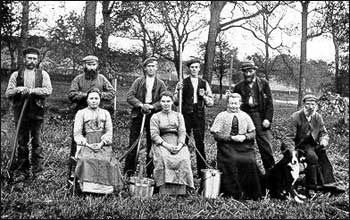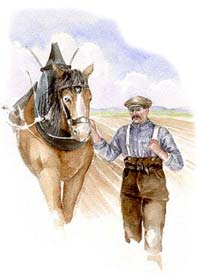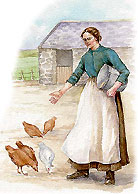Farm Workers and their Work
Who Did What, or "Fa did Fit."
The Workers and their duties.
Nowadays even quite large farms can be run by very few men. Why do you think this is? Think of the machinery you have seen being used on farms. However there were very few machines at the beginning of the twentieth century and most of the work had to be done by hand or with the help of horses.

Farm workers at South Colleonard Farm, near Banff, in 1916.
The Grieve or Foreman
"Maist ferms hid a grieve, as the fermer wid ca' him, but the lads aye ca'd him the gaffer. He wis responsible for the daily runnin' o' the ferm and the men hid little or nae dealins wi the fermer. Ye were aften mair feart o' the gaffer than the fermer himsel!" A Bothy Chiel, David Adams' "Bothy Nichts and Days."
The Grieve took his orders from the Farmer but was in charge of the rest of the
men and gave them their orders. He would also expect to be shown some respect.
For example, if he lived in the Bothy he would be given the side of the
bed nearest the fire, sit at the top of the table at meal times and be
allowed to wash first in the basin. A bad-tempered Grieve could make life
very hard for the men!
Horsemen
 Horsemen
were highly skilled men who were responsible for the horses.
Horsemen
were highly skilled men who were responsible for the horses.
Horses were very highly valued on the farms. They were used for the heavy
work which could not be done by men. Each horseman was responsible for
a pair of horses so if there were 3 pairs on a farm, then there would
be 3 horsemen and the First Horseman would be the most important.
They would rise at 5 a.m., attend to their horses, have their own breakfast and “yoke” (start work) at 6 a.m. ”Lousin time” (when they stopped work and let the horses loose) would be 6 p.m. although at "the hairst" (harvest time) they might have to keep going until 8 or 9 o’clock. Their work was very tiring as they often spent long hours walking behind the horses and guiding them while they harrowed or ploughed the ground ready for sowing or pulled the binder at harvest time.
The Horseman’s Word
Many horsemen belonged to a secret society called The Brotherhood of the Horseman’s Word. Members of this society were believed to have special powers over the horses. To become a member a young horseman would have to go through an initiation ceremony (complete some tasks) before being admitted into the society. Once a member he would be given the Horseman’s Word and told he must promise to keep it a secret.
Cattlemen or "Coo Baillies"
They looked after the cattle but were not thought to be as important as
the horsemen.
Orra loons
They were the least important workers and were often given the most unpleasant
jobs like mucking out the stables or byres, gathering stones or “howing
neeps” (thinning and weeding the turnips).
Kitchie Deems
Women too were appointed for set terms, usually to work in the kitchens, cooking for the farmer's family and the "bothy loons." These "kitchie deems" (kitchen dames or girls) were kept hard at work under the watchful eye of the farmer's wife.
 They
lived in the farmhouse perhaps in an attic room. Their duties included
feeding hens, milking cows, making butter and helping the Farmer’s
wife to prepare the men’s food. Their hours were often long beginning
as early as 5 a.m. and continuing well into the evening. Some young girls
were sometimes employed to scare the birds away from the newly planted
seeds.
They
lived in the farmhouse perhaps in an attic room. Their duties included
feeding hens, milking cows, making butter and helping the Farmer’s
wife to prepare the men’s food. Their hours were often long beginning
as early as 5 a.m. and continuing well into the evening. Some young girls
were sometimes employed to scare the birds away from the newly planted
seeds.
Feeing Markets
"There were feein' merkets at a' the toons in the district, wi the Muckle Merket at Aiberdeen. The term times were at Whitsunday, the 28th o' Mey, and at Mertinmas, the 28th o' November. Ye loused at dennertime on the 28th and ye hid aboot three days tae get a fee. If athin on the ferm wis weel aheid ye micht hae gotten aff a day or twa early." A Bothy Chiel, David Adams' "Bothy Nichts and Days."
Twice a year at Whitsun, in May, and Martinmas, in November, feeing markets
or hiring fairs were held in the market towns across the North East, in
places like Aberdeen, Inverurie, Ellon, Huntly and Stonehaven. Those were
the two days in the year when farmers and their workers could have a day
off work.
Some spent the day meeting friends, drinking and enjoying themselves but
others went there to find work or workers. Farm workers were only hired
for a six month term and if the farmer did not ask them to stay, they
were forced to find a new position. Workers who were unhappy with their
job could also decide to leave and the farmers would go to the markets
to hire men or women to replace them.
The market square would be crammed with people and stalls selling such things as farm produce, sweets, pills or medicines which would cure all ills, clothing and all types of fancy trinkets. In some places showmen were there with a "headless corpse" or other freak shows.
The Hiring
Men and women who were hoping for a fee stood around in twos or threes in the square. In some areas men stuck tickets in their caps to show that they were looking for work. The farmers wandered amongst them choosing who they would hire.
To seal the bargain the farmer would pay them a fee, often a penny, known as "arles".
Imagine how you might feel standing in the square waiting to be hired.

